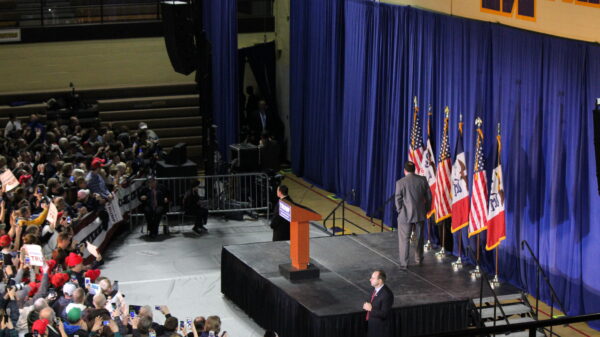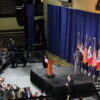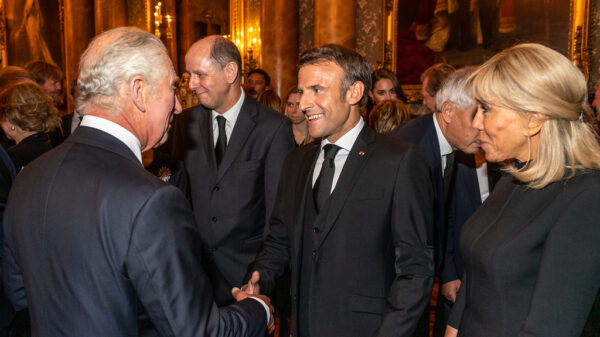Staff Writer, Sam Bryan, asked KCL students for their views on the Monarchy and received a plethora of opinions. This demonstrates the divisions present within a debate so pivotal to the UK’s constitution.
All quotes were collected through the writer’s research.
The 6 March 2023 marked a historic day for Britain as for the first time in over 70 years a new monarch, Charles III, was crowned in Westminster Abbey. With a large parade from Buckingham Palace to Westminster Abbey, a flyover which included the coveted Red Arrows and thousands of supporters lining the streets it was truly an experience for the residents of London. However with such celebrations came the unsurprising protests. In a complete juxtaposition with the enthusiastic royalists who camped out days before the event to get a good view of the King, thousands of protesters lined the streets surrounding the Mall and Buckingham Palace with distinctive yellow signs to display their quarrels with the monarchy, several of whom were arrested. This divide is a microcosm of one of the more controversial debates in British politics today, brought into the spotlight by the unfortunate death of Queen Elizabeth II in 2022. The debate in question: how relevant really is the monarchy in the 21st century? Die hard Royalists would argue about the significant cultural relevance of the Royal family, their symbolism and importance for tourism. In contrast republicans argue the monarchy wields too much cultural and political influence. To shed light on different aspects of this debate from a younger perspective I asked a variety of students at King’s College for their opinions on the matter and was greeted with a diverse array of viewpoints, showing just how dividing the matter is.
The responses I received held a wide variety of opinions addressing many of the Royal Family’s triumphs and downfalls. It is a distinctly Gen Z response from what I’ve gathered, with a majority of the anti-monarchical arguments focusing on issues of racism, finance and the notorious Prince Andrew. Contrastingly many of the pro-monarchy arguments focus on the cultural importance of the family and their continuing relevance as political figures.
Some students who were interviewed had a strong view in favour of the monarchy for a variety of reasons. Many students argued for the political significance of the monarchy, Zain (19) argued that the “Monarchy is still relevant and popular” and “acts as a check and balance between the state and government”, another commented that one only needs to look “across the pond” to see why a constitutional monarchy is very useful in “maintaining democracy”. (Anonymous). The chaotic and divided state of American politics seems to be what drives people towards a more unifying higher power such as a royal family. George Ashton, (20) argued that it is “one of a few things that, despite all other politics happening right now, other countries envy of us in my opinion” and that “the constitutional monarchy that the U.K. holds provides a point of consistency in a political climate that has become polarised”. Students seem to feel that the monarchy provides a significant political and cultural base for the country, acting as both a check and balance to the government and a point of interest to the people. Other students seem to enjoy the monarchy just as they are, with no wider political reasonings, almost like paternal figures to look up to. Finn Robinson (19) said “I think the monarchy is still very relevant and is a key factor to why the UK has so much respect world wide. The coronation was a brilliant testament to how great the monarchy is for the UK”.
On the other end of the spectrum, students hold strong opinions against the monarchical institution for a variety of reasons. For example, Henry Stone (19) argued the mass British support for the monarchy “is extremely irrational”, stating “they have no real legitimacy to their position”. It was not just political for Stone either; he went on further to say “Hereditary rule is the stuff of eugenics! When considering this has been achieved through years of colonialism, it seems even more absurd”. Stone referenced the Queen’s legacy in Kenya and the relative recency of the Royals’ colonial history, clearly arguing that people of such high status should not be so closely involved with such a dark part of our country’s history. Ben (24) also had issues with the colonial aspect of the royals’ past stating “Instead of wasting my time celebrating the family that led the country while they colonised and enslaved mine, I went to my friend’s birthday and barely even realised it (the coronation) was happening.” The monarchy’s past and what it stands for clearly strikes a nerve with many of KCL’s students, most of whom don’t agree with the idea of “colonisers” as head of state.
Furthermore, the event of the coronation opened up a new argument against the monarchy, with an exorbitant cost of up to 100 million pounds, some call into question how we’re so comfortable spending money on such an event amidst a cost of living crisis. Grace (18) questioned the Monarchy’s relevance, claiming it was an “outdated idea” and that the coronation was “very tone-deaf” with “the majority of families struggling at the moment”. Alex Bayley (20) went further to say “I believe the monarchy should have been laid to rest with the Queen”. Bayley expressed that despite the coronation’s attempt at unifying the country through “pomp and pageantry” it instead “lacked empathy” amidst a cost of living crisis and the worst decline in living standards since the 1950s. Bayley continued by discussing the relevancy of “God” in justifying the King’s wealth stating “if you were to take away the cloaks and gold and fanfare” you see a man who uses God to justify his obscene wealth. Bayley later used the poignant Bible quote “it is easier to get a camel through the eye of a needle than a rich man into heaven” to describe the hypocrisy of the royals.
Others, in true British fashion, were mostly indifferent and only offered minor changes to the system. I believe this uproots a key area of the debate which is that a majority of people just have more important things to focus on. 21 year old Geography student Will summed it up nicely saying he ‘‘Couldn’t give two sh**s about them” being “Neither pro- or anti-monarchist”. Some students offered minor changes to the system which they believe will make a difference. Charlie Hinds (19) said “I am generally ambivalent to the Royal Family, I would oppose their abolition but also believe that they should be self-funding which they can be but simply refuse to be”. A different Ben (19) said “The royal family is a very important part of our history. They are impartial in politics and also represent the country well (except Andrew)”… “the thing I think should be changed is that they don’t pay any inheritance tax”. A majority of people obviously have some inclinations towards and against the royals as we will further see, and are not 100% invested in either side of the argument. However there is a general consensus in favour of utilising their wealth for the benefit of the British Economy.
It is worth looking at an overseas perspective from some of KCL’s international students. Baran Ayguven (22), who’s Turkish, said “it is disappointing that they let paedophiles such as Prince Andrew walk around in coronations showing how they are ‘untouchables’ by law”. The disgrace of Prince Andrew seems to be the only issue a large number of students agree on, ironically the worst part of the monarchy seems to be the only uniting factor for the country. From an American perspective, Kian Donovan (19) provided an interesting political view on the monarchy’s power. Donovan promoted their unifying role that transcends political tribe, describing them as “symbols for all citizens, regardless of politics’’. However his gripe was on the financial side saying “The British monarchy’s opulence seems disrespectful to those who are struggling financially and could be taking funds away from potentially vital social programs”. Donovan describes the royals as a unifying body, however the existence of the current debate surrounding their relevance in 21st century Britain undermines this. The royals are falling short of one of their key purposes by creating a political divide between people because of their ‘opulence’ and disregard for the struggles of modern Britain. Kian clearly sums up the most significant sides of the debate, considering their political role in comparison to their financial burden in the 21st century. It seems students have picked one side or the other to support their view point when realistically both are very valid arguments which coexist with each other.
Finally Liam Bryant (22) had a very nuanced opinion to provide, he said, “The Monarchy is an outdated concept and has an aimless influence” citing that their only real political power is the granting of parliamentary acts through the “Royal Assent” which has not been withheld in a very long time, reducing their credibility as political figures. He continued saying, “The Royal Family has become a mere mantelpiece and a cash cow in the UK’s tourism sector”. Bryant however mentioned their use of charitable organisations such as the Royal Collection Trust, indicating some usefulness stemming from their touristic aspect. Overall, like others, he seemed indifferent about the family, rounding off his response with “As far as I’m concerned, the Monarchy should have been laid to rest with Lizzie”. It’s evident here that despite his reservations about the financial and political aspects of the monarchy, at the end of the day much like a majority of students it doesn’t particularly affect him.
Overall, KCL has provided a very wide spectrum of views regarding the monarchy, from die-hard royalists to the monarchic haters and everything in between the students who spoke all held well thought out and supported statements. There was almost no consensus on any particular aspect, apart from the disgrace of Prince Andrew. This displays the fantastic range of critical thinking and kaleidoscope of views employed at King’s. Furthermore, a large group of students did not have as much interest in the monarchy as I initially thought, even those who provided some fantastically nuanced answers overall had a tone of indifference. I believe it’s fantastic the university fosters a diverse set of opinions on big issues and can allow for a dialogue to occur within its walls. The next 20 years of monarchy should be highly interesting to watch as it develops and changes with people’s views as we leave university. I do believe Charles’ reign will be pivotal to the institution as a whole, especially in the wake of an iconic leader like Elizabeth II.

















